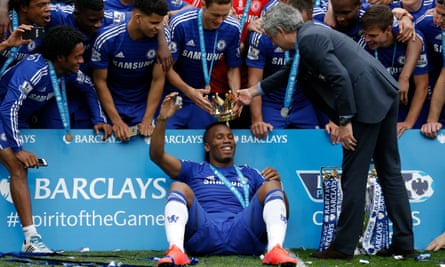As a coup de théâtre, Manchester United’s swoop for Romelu Lukaku was rather magnificent. A much-needed striker was acquired, Wayne Rooney was offloaded and José Mourinho’s last two clubs were left looking a little foolish – Chelsea as they failed to land a player who had seemed almost certain to join them since January and Real Madrid as they vainly held out on their valuation of Álvaro Morata. From a football point of view, though, the deal raises as many questions as it answers.
Assuming Morata was plan A for United – and unless United were playing some implausible double game he surely was – it is a significant change of tack to turn to Lukaku. They are very different players and the hop from one to the other reinforces the idea United’s transfer policy is based on buying individuals and then fitting them together rather than setting out with a coherent strategy. Or at least it would if Lukaku were not – whatever tensions may have existed between them in the past – such an obviously Mourinho style of striker.
Lukaku scores goals. He got 25 in the league last season, more than anybody other than Harry Kane, and that despite looking disaffected during the run-in. He will win aerial balls and offer a physical threat in the way Zlatan Ibrahimovic did and, while no one would suggest Lukaku is as skilful or imaginative as the Swede, he is significantly quicker. Lukaku may not run much – which could be an issue – but when he does he tends to be quick.
That means he can fulfil two vital roles in a Mourinho side: he can hold up the ball but he also offers a threat on the counter. His goal at Manchester City last October was stunning as he surged from halfway, going through two challenges before finishing neatly. That means when United sit deep, when they look to spoil, they will still offer a threat – which was why Didier Drogba, once he had found his feet in England, was such a key component of Mourinho’s Chelsea side.

Coming through at Chelsea, Lukaku was often identified as the new Drogba and, while Mourinho has also benefited from powerful, awkward forwards in Diego Milito and Diego Costa, that comparison is probably the most apt. Early in his career, Drogba was quick and powerful, a player who could impose himself physically on opponents – as he did, for instance, when playing for Marseille against Newcastle United in the second leg of the Uefa Cup semi-final in 2004 – but who was doubted for his finishing. It is easy to forget now but when Drogba arrived at Chelsea he was treated with significant scepticism; he may have scored 10 league goals in 2004-05 but he was regarded in those days as a wild finisher who could not be trusted in front of goal. Only in 2006-07 when he scored 20 league goals was he accepted as a striker of the highest calibre. By then he was 29.
Lukaku is 24. He may be experienced, with 211 top-flight starts behind him in Belgium and England, but he is still young. It may instinctively feel absurd that a player who costs £75m is not yet the finished product but it is not Lukaku’s fault that potential is currently the most valuable commodity in football. Perhaps he does, as Gary Neville has suggested, have a tendency to drift out of games – although it is not always easy to tell with forwards whether that is their own doing or the result of a lack of service.
The allegation has been cast that he does not score against the best sides, that he is a player to bully a hat-trick against Sunderland or four against Bournemouth but to an extent that is simply the nature of goalscorers – and breaking down lesser clubs was an area in which United struggled last season; besides which, Lukaku scored in both games against Manchester City and scored against Tottenham Hotspur and Arsenal (albeit a penalty) last season.
His first touch perhaps is not the most silky – he conceded possession to poor touches 2.1 times per game last season (as opposed to Morata’s 2) – but that is to an extent mitigated by the type of service he received from team-mates looking to exploit his aerial prowess.
Lukaku may not be the ideal striker for United but he is one of the four high-class forwards – along with Morata, Andrea Belotti and Kylian Mbappé – potentially available this summer. Landing one was essential and United have not merely done that but have acquired the one who has already scored 85 Premier League goals.
Comments (…)
Sign in or create your Guardian account to join the discussion